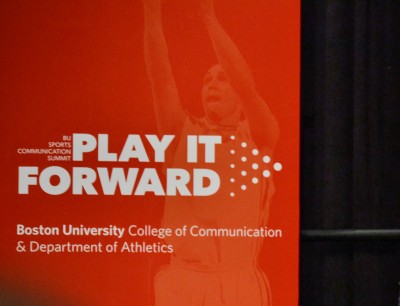
Boston University School of Medicine professor Ann McKee; Chris Nowinski, co-founder of the Concussion Legacy Foundation; and Rachel Blauner, a midfielder on the BU women’s soccer team, discussed concussions and their dangerous consequences in sports today during BU’s inaugural Play It Forward sports communication summit Friday afternoon.
The daylong summit, hosted by the College of Communication and the Athletics Department, featured a number of sports experts from multiple disciplines who engaged in conversations regarding the future of sports safety, technology, law and journalism.
During the sports safety session, McKee and Nowinski elaborated on the results of their respective and collaborated researches on the effects of brain trauma, zeroing in on chronic traumatic encephalopathy, to an audience of approximately 150 members of the BU community, the public and sports professionals.
“CTE is a neurodegenerative disease, which means that over time, it progressively causes the nerve cells in your brain to die and interferes with thinking, judgment and emotions,” McKee said.
Nowinski added, “CTE is a threat to the business model of some sports — specifically, football.”
McKee said she began her research on CTE when Nowinski asked her to examine the brain of a former NFL player, which differed from her focus on Alzheimer’s. Since then, McKee and Nowinski have worked together to combine elements of science and social awareness to help combat the CTE issue, she added.
A main area involved in studying CTE is youth sports, McKee said, as the length of time an athlete performs is significant.
“The brain is more susceptible to the injury when they’re young, so we want to keep the youth athletes out of these collision sports,” McKee said. “We know it’s length of exposure to this repetitive trauma that really triggers this long-term problem.”
Nowinski emphasized the danger of football among children in particular, as he said football further subjects them to longer periods of exposure to the risks of repeated head trauma.
During the session, Blauner, a senior in COM, talked about her personal history with concussions and how they’ve shaped her understanding of the long-term effects. After suffering three concussions in high school, Blauner said she approaches the issue seriously.
“Now I know the repercussions of multiple impacts to the head and what it can cause,” she said. “I definitely think about it more and am more cautious about the way I play, in regards to going in for headers.”
Acknowledging the social impact of sports, McKee brought up the need for a change in the way many are played, especially contact sports like football and soccer. She added that eliminating headers all together would reduce the risk of head injuries.
McKee said she is “very optimistic” about the future and is sure that “in the next 10, 15 [or] 20 years, we’ll come up with solutions,” but the prevalence of concussions and CTE in sports is still a cause for concern.
“I’d like to be able to treat concussions,” McKee said. “As far as CTE, we need to figure out a way to detect it and come up with some treatments for it.”
According to its website, the Concussion Legacy Foundation was founded in partnership with BUSM and the U.S. Department of Veterans Affairs in 2008. It helped create the VA-BU-CLF Brain Bank, led by McKee, as well as BU’s CTE Center.
Following a $30 million research grant from the National Institutes of Health in 2012, the CTE Center received approximately $16 million in NIH funding in December, The Daily Free Press reported on Dec. 24, 2015. The NFL pulled out of funding the latter grant.
Several attendees said they believe the sports industry needs to recognize and address the seriousness of CTE, but they recognized the difficulty of the decision to do so.
Nancy Feldman, head coach of the BU women’s soccer team, said she was incredible conflicted after learning about the increased risks of concussions, especially because heading has an important role in the sport. She also said she approves of BU’s role in educating students on the serious impact of these head injuries.
“I can see a world where heading is being taken out of the game, and that’s a bad world,” Feldman said.
Joseph Difazio, a second-year graduate student in COM, said he found the panel thought-provoking, particularly when the panelists talked about women’s sports.
“Nowinski did a good job of breaking down some of the issues with concussions in really sharp similes,” Difazio said. “The panel also was smart to highlight the trouble with concussions in non-football sports like women’s soccer.”
Dakota Randall, a first-year graduate student in COM, said he agreed with the panel’s emphasis on the risks of head injuries in youth sports.
“The most important thing in terms of preventing and dealing with CTE is changing the way the games are played at the youth level,” he said.















































































































